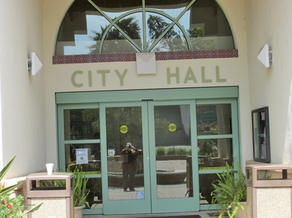City fees will be appearing on county property tax bill
The City Council approved the maximum allowable increase in Avalon sewer, trash, and saltwater fees at the Tuesday, June 1 meeting. The number of written protests did not reach the threshold to prevent the fee increase.
According to the city attorney, the council can revisit the issue annually when they approve putting the fees on the county’s property tax bill. (Basically, the county is functioning as the collector of the fees.) “You can set what the fees are each year when that comes back to you,” said City Attorney Scott Campbell.
The vote was 4-1, with Councilmember Cinde MacGugan-Cassidy casting the dissenting vote.
Cassidy expressed concerned about increases in general, and about what she described as poor trash collection service during the pandemic. Cassidy believes the city is owned credit for that. Cassidy later said she would be willing to vote for the sewer and saltwater fees.
Finance Director Matthew Baker said these were considered fees, not taxes. He explained that the city has the money collected through the county property tax bill. According to Baker, it costs Avalon 25 cents per land parcel to collect the sewer, saltwater, and solid waste (trash) fees this way.
According to Baker, drivers of the fee increases include a state mandate to separate organic waste that will go into effect next year, and the city’s efforts to extend the life of the landfill. “We don’t have $6.9 million in reserves in the General Fund to cover that,” Baker said, referring to the landfill.
According to Shawn Koorn of HDR Engineer, the change in each type of fee—solid waste, sewer, and saltwater—would amount to about $5 a month.
Jon Council, speaking in person, said it seemed that a lot of the burden was being placed on the residents when the bulk of the waste (trash) was generated by visitors. He also acknowledged that costs to businesses would be passed on to those visitors. “The costs of coming here are going to increase,” Council said.
Former council member Oly Olsen came to the podium to argue that if the city doesn’t make enough money from providing the services, the city would have to subsidize the services. He urged a vote for the increase.
Cassidy wasn’t convinced. “Specifically, I disagree with the cost of service,” Cassidy said.
City Attorney Scott Campbell said the city would have to reach a 4-5 specifically to put the fees on the county property tax bill. According to Campbell, if the vote was 3-2, the city would have to make the bills to customers.
Councilmember Michael Ponce argued for the necessity of the fee increases. “Let’s not forget that we just went through a pandemic that devastated our economy and the city’s ability of revenue , to the point we’ve had to pull from reserves,” he said. He asked that if it happens again in the next couple of years, where will the city get the money it needs.
Councilmember Yesenia De La Rosa apparently agreed. : “It’s tough,” she said.
“This was going to happen today or it will happen in the next couple of years,” she said.
“So it’s not something we can put off,” she said.











